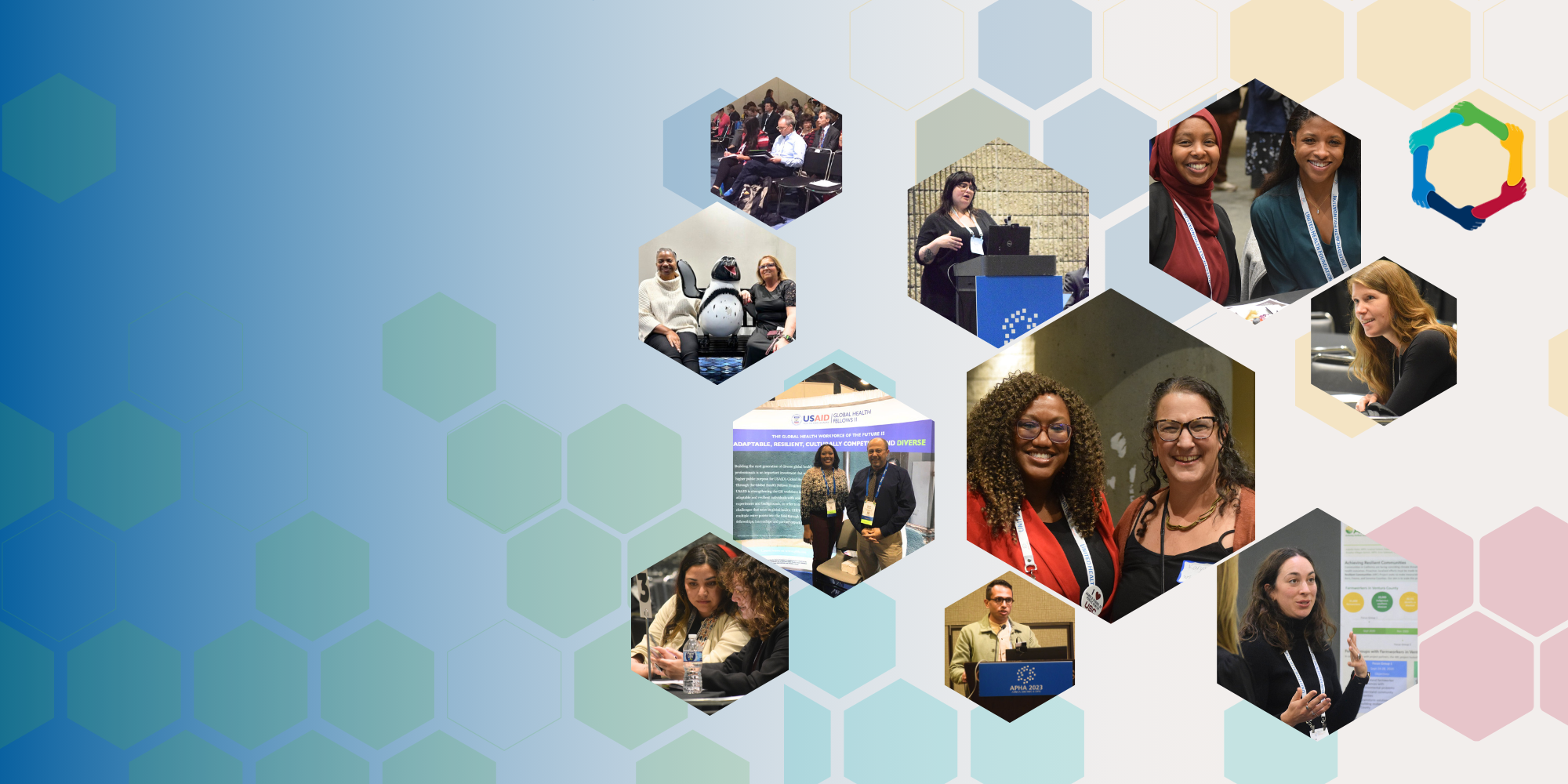
PHI at APHA 2024
PHI and its programs are returning to share their research, expertise, and new ideas at APHA 2024, which is being held in-person in Minneapolis, Minnesota from October 27-30.
- Follow us on Twitter at #phiAPHA for updates on sessions and live tweets of some presentations.
- Explore more of our program work through extra resources we’ve included below that give you background information on the presenters, research and programs.
We look forward to connecting with you.
APHA PHI 2024 Daily Schedule
Sunday | Monday | Tuesday
Sunday, October 27, 2024
1:00 pm – 2:00 pm CST: Epidemiology and Etiology of Multiple Substance Use (2007)
![]() 1:00 pm CST Poster: Burden experienced from other people’s identified use of alcohol, cannabis, or other drugs besides cannabis, or combinations of these substances
1:00 pm CST Poster: Burden experienced from other people’s identified use of alcohol, cannabis, or other drugs besides cannabis, or combinations of these substances
Thomas Greenfield, Senior Scientist, Alcohol Research Group
Libo Li, PhD, Senior Biostatistician, Alcohol Research Group; Cat Munroe, PhD, Alcohol Research Group; Deidre Patterson, MPH, Alcohol Research Group; Yachen Zhu, PhD,Alcohol Research Group Biostatistician; William Kerr, PhD, Senior Scientist and Center Director, Alcohol Research Group.
Katherine Karriker-Jaffe, PhD, Research Triangle Institute;
Erika Rosen, PhD, California State University, Northridge (at PHI at time of the study)
In our “US Alcohol and Drug Harm to Others Survey” a scale measured burden from second hand substances; we found that people affected by others’ AOD use experienced substantial burden from others’ use of alcohol, cannabis, and combinations other drugs.
 More from Alcohol Research Group: Research from PHI’s Alcohol Research Group and partners, published in the Journal of Studies on Alcohol and Drugs, found that secondhand harms from others’ alcohol use were more prevalent than those from others’ use of any drug. Learn more.
More from Alcohol Research Group: Research from PHI’s Alcohol Research Group and partners, published in the Journal of Studies on Alcohol and Drugs, found that secondhand harms from others’ alcohol use were more prevalent than those from others’ use of any drug. Learn more.
2:30 pm – 4:00 pm CST: Innovative Programs Which Build Trust in Public Health and Science through Health Administration (2074)
![]() 2:30 – 2:45 pm CST Presentation: Exploring the relationship between collaboration dynamics and trust in health collaboratives
2:30 – 2:45 pm CST Presentation: Exploring the relationship between collaboration dynamics and trust in health collaboratives
Stephanie Bultema, PhD, MA, Director, MERLIN: Monitoring, Evaluation, Research, and Learning Innovations, Population Health Innovation Lab
This presentation explores the relationship between collaboration dynamics and trust in Accountable Communities of/for Health (ACHs).
![]() 3:00 – 3:15 pm CST Presentation: Revitalizing the public health workforce: Rebuilding trust through pathways programs
3:00 – 3:15 pm CST Presentation: Revitalizing the public health workforce: Rebuilding trust through pathways programs
Karya Lustig, MA, ISS, Director, Strategy and Implementation, Center for Health Leadership & Impact
Amy Max, MPH, Center for Health Leadership & Impact; Karlene Kuhn, MA, Center for Health Leadership & Impact; Tamnnet Kidanu, MPH, Center for Health Leadership & Impact
Carmen Nevarez, MD, Senior Advisor, PHI Center for Health Leadership & Impact
Presenters will highlight two innovative programs that are broadening the trust and visibility of public health careers among younger generations.
3:00 pm – 4:00 pm CST: Public Health in Action (2126)
![]() 3:00 pm CST Poster: Developing a guide to using CDC data for rural analysis
3:00 pm CST Poster: Developing a guide to using CDC data for rural analysis
Kendra Piper, PhD, MPH, Senior Research Scientist, Population Health Innovation Lab
Esmeralda Salas, BS, Research Associate II, Population Health Innovation Lab; Stephanie Bultema, PhD, Director of MERLIN, Population Health Innovation Lab
Kevin Matthews, PhD, Centers for Disease Control and Prevention
The CDC publishes several underutilized public health datasets containing rural variables, and to increase awareness of these datasets, the CDC and PHIL are developing a guide titled The Cookbook: A Guide to Using CDC Data for Rural Analysis.
3:00 pm – 4:00 pm CST: Data and Epidemiology (2120)
![]() 3:00 pm CST Poster: Community characteristics of pregnancy-related cardiovascular deaths in California, 2015-2019
3:00 pm CST Poster: Community characteristics of pregnancy-related cardiovascular deaths in California, 2015-2019
Christy McCain, Director, Data Collection and Analysis, California Pregnancy-Associated Mortality Review
Dan Sun, MA, California Department of Public Health
Residing in communities with elevated rates of chronic health conditions, limited access to healthcare, or no prenatal care exacerbates PR-CVD mortality risk. Community-level interventions are needed to improve population health and ultimately reduce PR-CVD mortality
![]() 3:00 pm CST Poster: Emergency department and hospital utilization patterns among California pregnancy-related deaths, 2017-2021
3:00 pm CST Poster: Emergency department and hospital utilization patterns among California pregnancy-related deaths, 2017-2021
Christy McCain, Director, Data Collection and Analysis, California Pregnancy-Associated Mortality Review
Having frequent ED visits or accessing care at multiple hospitals is associated with complex medical issues but may also represent dissatisfaction with care, mistrust or structural discrimination. System-level approaches are needed to improve maternity care and decrease pregnancy-related mortality.

More from the California Pregnancy-Associated Mortality Review: This report finds that California’s rate of pregnancy-related deaths has remained low compared with the U.S. rate and has been largely stable from 2008 to 2016. However, racial/ethnic disparities in pregnancy-related mortality ratios appear to be worsening, particularly among Black women. Black women were overrepresented among pregnancy-related deaths from all causes, especially deaths that occurred in pregnancy prior to birth or after delivery hospitalization. Learn more.
4:30 pm – 6:00 pm CST: Addressing Health Disparities through Health Promotion Initiatives (2183)
![]() 4:30 pm – 5:00 pm CST Presentation: Enhancing local health department capacity for data-driven outbreak response in healthcare settings
4:30 pm – 5:00 pm CST Presentation: Enhancing local health department capacity for data-driven outbreak response in healthcare settings
Seun Aluko, MPH, Lead Research Scientist, Population Health Innovation Lab
Stephanie Bultema, PhD, Population Health Innovation Lab; Kendra Piper, PhD, MPH, Population Health Innovation Lab; Beverly Bruno, MPH, Population Health Innovation Lab; Casandra Mohan, MSPH, Population Health Innovation Lab; Esmeralda Salas, BA, Population Health Innovation Lab
Krishna Patel, DrPH; National Association of County and City Health Officials (NACCHO); Timothy McCall, PhD; National Association of County and City Health Officials (NACCHO)
The presentation discusses enhancing Local Health Department (LHD) capacity for data-driven outbreak response, focusing on overcoming challenges and promoting equity. It highlights strategies, technical assistance, and tools developed to support LHDs in improving public health infrastructure.
4:30 pm – 6:00 pm CST: More Than Individual Choice: How Context Shapes Alcohol Use (2136)
![]() 4:45 pm CST Presentation: Unjust alcohol environments: The role of structural racism in the alcohol outlet density — violent crime link
4:45 pm CST Presentation: Unjust alcohol environments: The role of structural racism in the alcohol outlet density — violent crime link
Erika M. Rosen, California State University, Northridge (at PHI’s Alcohol Research Group at the time of the study)
Deidre Patterson, MPH, Alcohol Research Group; Pamela Trangenstein, PhD, Alcohol Research Group
Richard Sadler, PhD, MPH
This study examined the role of neighborhood-level structural racism in associations between alcohol outlet density (AOD) and violent crime in Baltimore, Maryland.
5:00 pm – 6:00 pm CST: Novel Approaches to Addressing Substance Use Disorder and Health Inequities (2201)
![]() 5:00 pm – 6:00 pm CST Poster: Beyond awareness: Building equitable solutions to the overdose crisis
5:00 pm – 6:00 pm CST Poster: Beyond awareness: Building equitable solutions to the overdose crisis
Karya Lustig, MA, ISS, Director, Strategy and Implementation, Center for Health Leadership & Impact
Amy Max, MPH, Center for Health Leadership & Impact; Veronica Johnson, MPH, Center for Health Leadership & Impact
Carmen Nevarez, MD, Senior Advisor, Center for Health Leadership & Impact
Speakers will showcase the guided process and health equity tool that public health leaders across California have used to drive equity-driven strategies and rebuild trust with communities of color (COCs).
Monday, October 28, 2024
10:30 am – 11:30 am CST: Violence Prevention and Control Poster Session (3086)
![]() 10:30 am – 11:30 am CST Poster: Talking about domestic violence and firearms: What’s missing from narratives and how we can communicate more effectively to save lives
10:30 am – 11:30 am CST Poster: Talking about domestic violence and firearms: What’s missing from narratives and how we can communicate more effectively to save lives
Pamela Mejia, Director of Research & Associate Program Director, MS, MPH, Berkeley Media Studies Group
Kim Garcia, MPH, Berkeley Media Studies Group; Hina Mahmood, MPH, Berkeley Media Studies Group; Lori Dorfman, DrPH, Berkeley Media Studies Group
In this session, we will share findings from an extensive narrative-change project and highlight best practices for advocates communicating about domestic violence involving firearms and making the case for solutions that can keep families and communities safe.
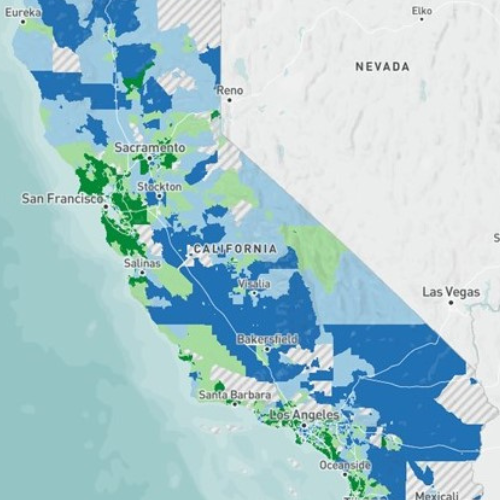
Special Session: The Healthy Places Index in Action: From Mapping Community Data to Health Equity Impact
![]() 10:35 am CST Presentation: California’s Journey with the Healthy Places Index: Successes, Challenges, and Lessons Learned
10:35 am CST Presentation: California’s Journey with the Healthy Places Index: Successes, Challenges, and Lessons Learned
Helen Dowling, MPH, Director of Data Initiatives, Public Health Alliance of Southern California
Introduction to the HPI platform, including key features informed by our Community Partners, and examples of how HPI has equitably directed over $4 billion in grant dollars, from community health assessments to climate resiliency plans.
![]() 10:55 am CST Presentation: Bringing the Healthy Places Index to Utah: Leveraging Small-Area Life Expectancy Estimates to Localize a Powerful Tool
10:55 am CST Presentation: Bringing the Healthy Places Index to Utah: Leveraging Small-Area Life Expectancy Estimates to Localize a Powerful Tool
Adrienne Damicis, MS, HPI Operations and Analytics Unit Manager, Public Health Alliance of Southern California
Sarah Hodson, MS, Deputy Director, Office of Health Promotion and Prevention, Utah Department of Health and Human Services
Details the methodology of the Utah Healthy Places Index, a state-based health equity index that centers the social determinants of health, provides hyper-local data for actionability at the neighborhood level, and leverages a rigorous, data-driven methodology.
![]() 11:35 am CST Presentation: Health Equity Metrics and the Healthy Places Index: Implications for Public Health Surveillance and Practice
11:35 am CST Presentation: Health Equity Metrics and the Healthy Places Index: Implications for Public Health Surveillance and Practice
Neil Maizlish, PhD, Senior Data Advisor, Public Health Alliance of Southern California
We illustrate the use of the Healthy Places Index as a health equity metric for stratifying health outcomes in communicable disease reporting, hospital discharge, and mortality.
12:30 –1:30 pm CST: Stigma, Discrimination, and Trauma Poster Session (3192)
![]() 12:30 – 1:30 pm CST Poster: Culturally competent and trauma-informed mental health services for AAAI youth in Alameda County, CA
12:30 – 1:30 pm CST Poster: Culturally competent and trauma-informed mental health services for AAAI youth in Alameda County, CA
Tooru Nemoto, Ph.D. Research Program Director, Health Intervention Project for Underserved Populations
Mariko Iwamoto, M.A., Project Director; Min Zheng, B.A., Research Associate, Health Intervention Project for Underserved Populations; Ellen Chang, B.A., Research Assistant, Health Intervention Project for Underserved Populations; Keye Xu, Ph.D., Research Associate, Health Intervention Project for Underserved Populations
This poster presented the implementation and results of the IWAY and IWAY2 projects, which collaborated with community-based mental health service agencies to provide trauma-informed mental health care and prevention for AAAI youth in Alameda County, CA.
 More from Health Intervention Project for Underserved Populations: The Lotus Project’s Youth Mental Health Blog Project amplifies Asian American & Asian Immigrant youth voices, stories, and experiences while addressing various topics ranging from culture, identity, racism, and mental health in the AAAI community. Learn more.
More from Health Intervention Project for Underserved Populations: The Lotus Project’s Youth Mental Health Blog Project amplifies Asian American & Asian Immigrant youth voices, stories, and experiences while addressing various topics ranging from culture, identity, racism, and mental health in the AAAI community. Learn more.
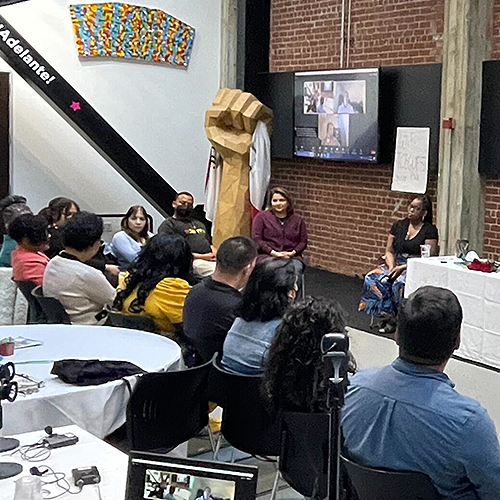
2:30 - 4:00 pm CST: Philanthropy's Role in Building a Just, Multi-Racial Democracy and Healthy Society (3238)
Moderator: Julia Caplan, Executive Director, State of Equity
Alex Goldman, Senior Portfolio Manager, Blue Meridian Partners
Stan John, Senior Program Officer, Bill & Melinda Gates Foundation
Ana Gallego, Senior Program Officer, Robert Wood Johnson Foundation
Kirin Kumar, Director for Climate and Disaster Resilience, Northern California Grantmakers
Attacks on democracy are a threat to public health, and philanthropy has an essential role to play by backing government workers who are fighting for racial justice and health equity inside our public institutions. This panel will discuss the role of philanthropy in government transformation and racial equity work, and will explore what is needed to deepen the bench of support for these efforts.
2:30 – 4:00 pm CST: Crafting Messages and Narrative for Health Policy Advocacy (organized by HCWG) (3288)
![]() 3:15 pm CST Presentation: Communicating about park and green space equity
3:15 pm CST Presentation: Communicating about park and green space equity
Hina Mahmood, MPH, Media Researcher, Berkeley Media Studies Group
Pamela Mejia, MS, MPH, Director of Research and Associate Program Director, Berkeley Media Studies Group; Kim Garcia, MPH, Media Researcher, Berkeley Media Studies Group
Parks are integral parts of our communities that benefit our health, but many neighborhoods lack them. We will share tools to communicate with decision-makers about how we can use inclusive processes to achieve park equity and racial justice.
Tuesday, October 29, 2024
8:30 am– 10:00 am CST: Chronic Disease and Community Health Research and Policy Implementation (4017)
![]() 8:30 am CST Presentation: Implementation of social needs screening and closed-loop referrals within a food is medicine program for diabetes
8:30 am CST Presentation: Implementation of social needs screening and closed-loop referrals within a food is medicine program for diabetes
Betty Sun, MS, RD, Program Manager, Food is Medicine, Center for Wellness & Nutrition
Maggie Wilkin, MPH, Director of Research & Evaluation, Center for Wellness & Nutrition; Lizania Romero, BS, Research Associate, Center for Wellness & Nutrition
Learn about the findings and closed-loop referrals made to Future Well Communities partners during a social needs screening for over 1300 participants with diabetes as part of the Healthy Food Rx food is medicine program in Stockton, CA.
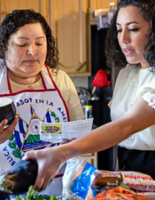 More from Center for Wellness & Nutrition: The results from the Healthy Food Rx Program indicate that a program addressing social determinants of health providing healthy meals, produce, and staple items delivered to participants’ homes through community partnerships was associated with improved health outcomes in participants. Learn more.
More from Center for Wellness & Nutrition: The results from the Healthy Food Rx Program indicate that a program addressing social determinants of health providing healthy meals, produce, and staple items delivered to participants’ homes through community partnerships was associated with improved health outcomes in participants. Learn more.
8:30 am– 10:00 am CST: Extending Our Understanding of the Factors Driving Heavy and Hazardous Drinking (4001)
![]() 9:00 am CST Presentation: Risky relationships: Secondhand harms and consequences associated with college students’ relationships with heavy drinkers
9:00 am CST Presentation: Risky relationships: Secondhand harms and consequences associated with college students’ relationships with heavy drinkers
Erika M. Rosen, California State University, Northridge (at PHI’s Alcohol Research Group at the time of the study)
Pamela Trangenstein, PhD, MPH, Alcohol Research Group; Christina Tam, PhD, MSW, Alcohol Research Group
Jih-Cheng Yeh, Boston University School of Public Health, Boston, MA; David Jernigan, PhD, Boston, MA
This study uses propensity score weighting to overcome the analyses challenge that people with and without heavy drinkers in their lives often differ systematically while assessing the role of college students’ relationships with heavy drinkers in harms and related consequences.
10:30 am – 11:30 am CST: Current Research on Multiple Substance Use (4066)
![]() 10:30 am – 11:30 am CST Poster: The emergency department as a critical hub for advancing substance use disorder-focused public health interventions
10:30 am – 11:30 am CST Poster: The emergency department as a critical hub for advancing substance use disorder-focused public health interventions
Arianna Campbell, MPH, PA-C, Bridge
Andrew Herring, MD, Bridge; Aimee Moulin, MD, Bridge
Integrating public health initiatives into emergency department (ED) practice, particularly for substance use disorder treatment, presents a unique opportunity to engage populations at critical moments in their healthcare journey. We will share findings from our unprecedented statewide expansion of MOUD access in EDs across California.
10:30 am– 12:00 pm CST: No Trust without Sustainability: Leveraging and Linking Long-Term Funding Opportunities to Maintain Equitable Community Health Outcomes (4113)
![]() 10:30 am CST Presentation: Advancing trusted government CBO partnerships for the public’s health through public health infrastructure funds
10:30 am CST Presentation: Advancing trusted government CBO partnerships for the public’s health through public health infrastructure funds
Karya Lustig, MA, ISS, Director, Strategy and Implementation, Center for Health Leadership & Impact
This session will explore the Center for Health Leadership & Impact hub TA approach of showcasing PHI resources and scaling opportunities for PHD’s through a proactive training and TA model.
12:30 –1:30 pm CST: Fostering reproductive health practice change in the ED: Learnings from access bridge (4187)
![]() 12:30 –1:30 pm CST Poster: Fostering reproductive health practice change in the ED: Learnings from Access Bridge
12:30 –1:30 pm CST Poster: Fostering reproductive health practice change in the ED: Learnings from Access Bridge
Elizabeth Keating, Program Director, Access Bridge, Bridge
Lisa Roazen, MD, Access Bridge Fellow, Bridge
This poster will demonstrate the impact of Access Bridge’s novel program to improve reproductive health care delivery from America’s emergency departments.
2:30 pm – 4:00 pm CST: Day in the life of an Alcohol, Tobacco and Other Drug (ATOD) Colleague: Learning from Each Other (4211)
![]() 2:35 pm CST Presentation: Table 3: Publishing in ATOD
2:35 pm CST Presentation: Table 3: Publishing in ATOD
Thomas Greenfield, Senior Scientist, Alcohol Research Group
In this round table session, Tom will describe a range of journals publishing ATOD studies, their impact factors, and how to select an appropriate outlet and prepare manuscripts for for various types of contributions.
4:30 pm – 6:00 pm CST: Academic-Practice Linkages That Support the Recruitment, Retention, and Training Needs of the Public Health Workforce: Part 2 (4275)
![]() 4:45 pm CST Presentation: Investing in the future to rebuild trust in public health: Revitalizing the workforce through academic and practice linkages
4:45 pm CST Presentation: Investing in the future to rebuild trust in public health: Revitalizing the workforce through academic and practice linkages
Karya Lustig, MA, ISS, Director, Strategy and Implementation, Center for Health Leadership & Impact
Carmen Nevarez, MD, Senior Advisor, Center for Health Leadership & Impact
Amy Max, MPH; Karlene Kuhn, MA; Tamnnet Kidanu, MPH
During this session, presenters will highlight two innovative programs that are broadening the trust, visibility, and sustainability of public health careers for younger generations.
4:30 pm – 6:00 pm CST: Building Healthy and Resilient Communities (4299)
![]() 5:00 pm CST Presentation: Assessing community resilience to extreme heat in California – the Healthy Places Index: Extreme Heat Edition
5:00 pm CST Presentation: Assessing community resilience to extreme heat in California – the Healthy Places Index: Extreme Heat Edition
Coline Bodenreider, MPH, Public Health Alliance of Southern California
Helen Dowling, MPH, Public Health Alliance of Southern California; Neil Maizlish, PhD, Public Health Alliance of Southern California; Tracy Delaney, PhD, Public Health Alliance of Southern California
Colleen Callahan, MA
With the University of California, Los Angeles Luskin Center for Innovation, we created the Healthy Places Index: Extreme Heat Edition (HPI: EHE), an interactive map platform designed to allow users to comprehensively evaluate community exposure and resilience to EH.
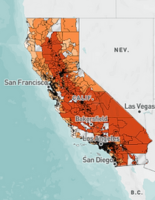 More from Public Health Alliance of Southern California: The Healthy Places Index: Extreme Heat Edition allows community groups, government entities, schools, tribal organizations, community members and other key audiences to identify which areas and populations will be most affected by heat, so they can determine what protections or interventions are most needed to address these challenges. Learn more.
More from Public Health Alliance of Southern California: The Healthy Places Index: Extreme Heat Edition allows community groups, government entities, schools, tribal organizations, community members and other key audiences to identify which areas and populations will be most affected by heat, so they can determine what protections or interventions are most needed to address these challenges. Learn more.
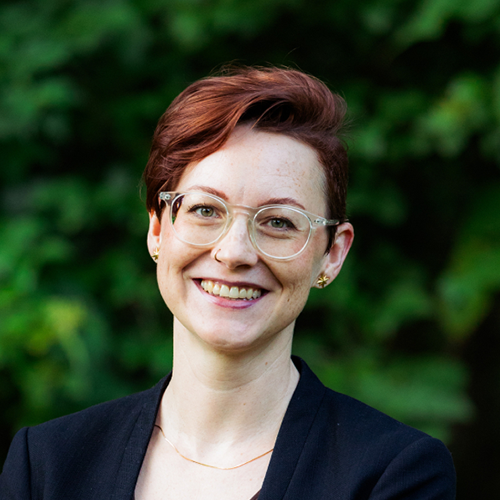
Helen Dowling, MPH, Director of Data Initiatives
Public Health Alliance of Southern CaliforniaHelen Dowling, MPH is the Director of Data Initiatives at the Public Health Alliance. At the Alliance, Helen leads work to advance state, regional, and local data projects. She serves as the project manager of the Healthy Places Index (HPI), a data and policy platform created to advance health equity through accessible data. Helen brings a multi-disciplinary lens to her work at the Alliance, drawing on her background in sociology, information technology, and epidemiology. She is passionate about challenging data collection and visualization paradigms that perpetuate inequity, and is dedicated to using data to uplift communities across California.
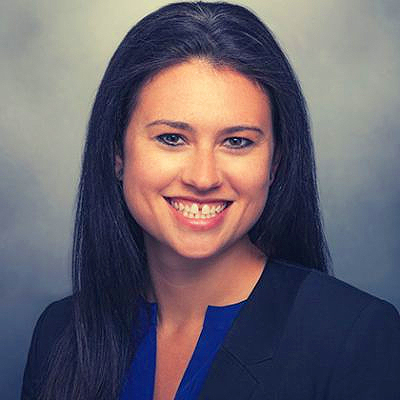
Elizabeth Keating, MPA, Program Director
BridgeProgram Director Elizabeth Keating, MPA serves as the principal investigator for this project. She has a decade of experience organizing physicians to embrace practice change and published her abortion story nationally.
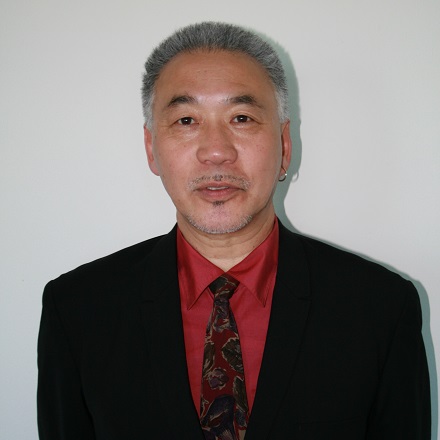
Tooru Nemoto, PhD, Research Program Director
Health Intervention Projects for Underserved PopulationsDr. Tooru Nemoto is Research Program Director at the Public Health Institute (PHI). Before joining PHI, Dr. Nemoto was Associate Professor, Department of Medicine, University of California San Francisco (UCSF). He has been mainly engaging in substance abuse and HIV prevention studies and service projects for under-served and stigmatized populations. He has been awarded a number of grants and service contracts from NIH, SAMHSA, CDC, HRSA, and private foundations. As Project Director, he recently completed a 5-year SAMHSA funded project providing trauma-informed care and prevention services targeting Asian youths in Alameda County.
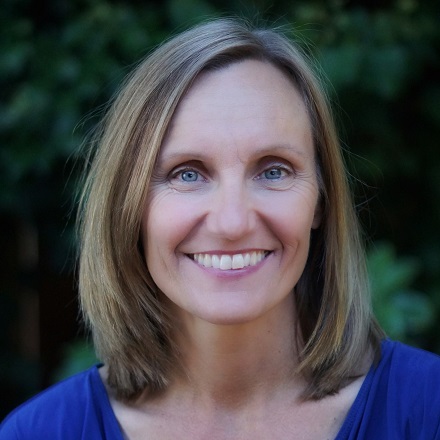
Christy McCain, MPH
California Pregnancy-Associated Mortality ReviewMs. McCain has directed the data collection and analysis for the California Pregnancy-Associated Mortality Review, an enhanced surveillance project with the California Department of Public Health and the California Maternal Quality Care Collaborative at Stanford, since its inception in 2006. With her team, Ms. McCain has reviewed thousands of medical records and coroner reports and has worked with multiple diverse expert committees to identify contributing factors and quality improvement opportunities. Ms. McCain has co-authored numerous presentations and publications related to pregnancy-related mortality including methodology papers, cause-specific papers (cardiovascular disease, preeclampsia, obstetric hemorrhage), disparities analyses, obesity, and maternal suicide and homicide.

Betty Sun, MS, RD, Program Manager
Center for Wellness & NutritionBetty is the Program Manager for PHI-Center for Wellness & Nutrition’s Food is Medicine work in Stockton, CA.

Kendra Piper, PhD, MPH, Senior Research Scientist
Population Health Innovation LabKendra Piper, PhD, MPH is the Senior Research Scientist at the Population Health Innovation Lab where she manages and contributes to research and evaluation projects within Monitoring, Evaluation, Research, and Learning Innovations (MERLIN). Kendra earned a BS in Environmental Health from the University of Georgia. She received both a PhD in Health Education and Health Promotion and a MPH with a focus on Maternal Health and Global Health from the University of Alabama at Birmingham.
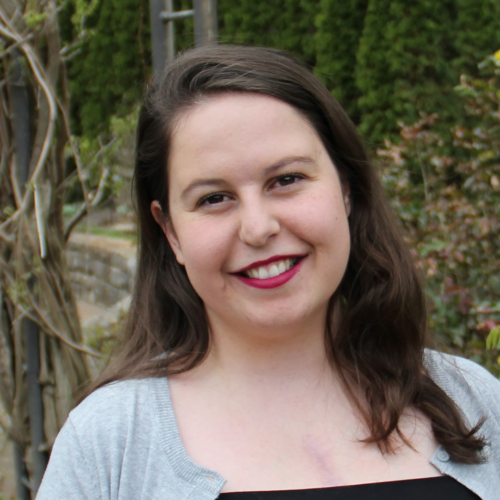
Adrienne Damicis, MS, HPI Operations and Analytics Unit Manager
Public Health Alliance of Southern CaliforniaAdrienne is the manager of the HPI Operations and Analytics Unit at the Public Health Alliance of Southern California. She works to enhance and expand the Healthy Places Index (HPI) map platform, a data and policy platform created to advance health equity through accessible data. Adrienne strives to create impactful and equity-centered data tools and visualizations that can act as integral resources for health and racial justice work. Adrienne has a Master of Science in biostatistics from The Ohio State University.
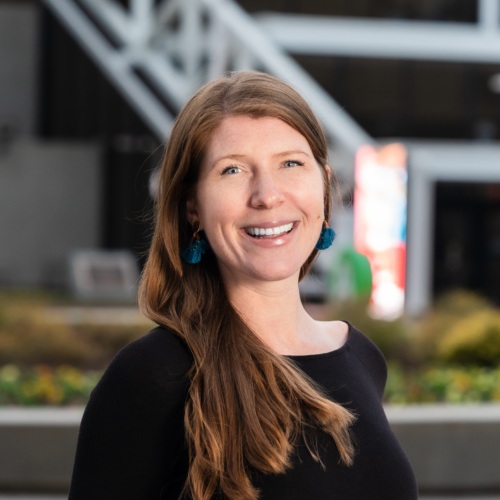
Stephanie Bultema, PhD, MA, Director of MERLIN: Monitoring, Evaluation, Research, and Learning Innovations
Population Health Innovation LabStephanie Bultema works as Director of MERLIN: Monitoring, Evaluation, Research, and Learning Innovations at the Public Health Institute’s Population Health Innovation Lab (PHIL). Her research and practice focus on systems change for improved population health, well-being, and equity. Before joining the PHIL team in 2020, Dr. Bultema worked as Senior Researcher in the Center on Network Science (2017-2020) and served as a public health professional from 2010-2017, most recently as an Assessment Epidemiologist. Dr. Bultema earned a PhD in Public Affairs from the University of Colorado Denver and an M.A. in Administrative Leadership from Whitworth University.

Neil Maizlish, PhD, Senior Data Advisor
Public Health Alliance of Southern California
Neil Maizlish, PhD, MPH is an epidemiologist with over 35 years of experience in quantitative research methods, statistics, and health informatics in local and state government, academia, community clinics, unions, and the private sector. He currently a senior Research Scientist at the Public Health Institute, focusing on the development of healthy community indicators for public health surveillance and healthcare.
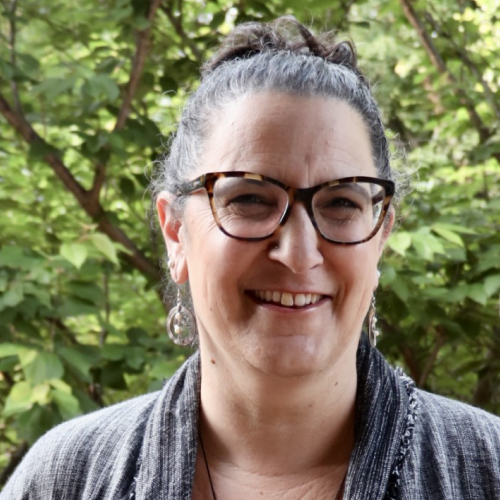
Karya Lustig, MA, ISS, Director, Strategy and Implementation
PHI Center for Health Leadership & ImpactKarya Lustig is Director of Strategy and Implementation at PHI’s Center for Health Leadership & Impact. With 25+ years’ experience, Lustig serves as a visionary thought leader applying strategic design and industry leading approaches to solve population health challenges. Her career has been grounded in the most pressing public health challenges of our time including overdose prevention, homelessness, HIV prevention, and behavioral/mental health, and her work is driven by foundations of social justice and equity.
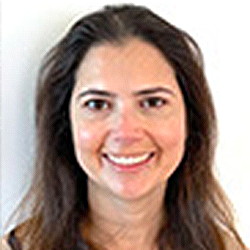
Hina Mahmood, MPH, Media Researcher
Berkeley Media Studies GroupHina Mahmood supports the research team through content analysis and developing coding tools and has been published in the Journal of Health Equity and Preventive Medicine Reports. Before joining BMSG, she worked as an economic researcher at the IFC, World Bank Group, was a freelance journalist for Dawn News, and did brand marketing at Procter & Gamble. She received a B.A. in economics and political science from McGill University and a master’s in public health from the University of California, Berkeley.
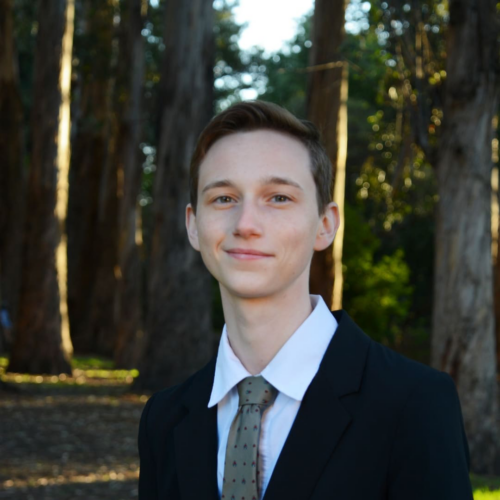
Coline Bodenreider, MPH, Climate Change and Health Data Lead
Public Health Alliance of Southern CaliforniaColine Bodenreider (they/them) is a Climate Change and Health Data Lead at the Public Health Alliance of Southern California where they work to meet the data needs of the Alliance’s various projects, including the Healthy Places Index (HPI) and the HPI: Extreme Heat Edition. Coline is passionate about conducting impact-focused research that advances environmental and social justice. Coline obtained their Master of Public Health in Environmental Health Sciences from the University of California, Berkeley.
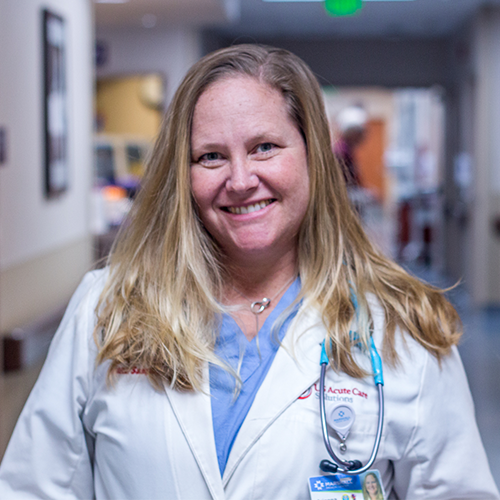
Arianna Campbell, MPH, PA-C
BridgeArianna is a Physician Associate (PA) focused on emergency and addiction medicine and one of the pioneers of Bridge, an innovative low-barrier system of care to treat substance use disorders. She has more than 24 years of clinical experience working in rural California at Marshall Medical Center and at VA Northern California Healthcare System. As senior director and co-principal investigator for Bridge, she leads both national and California-specific public health programs to increase access to care for people who use drugs. She completed her MPH from Johns Hopkins in 2023 where she was awarded Excellence in US Public Health Practice.
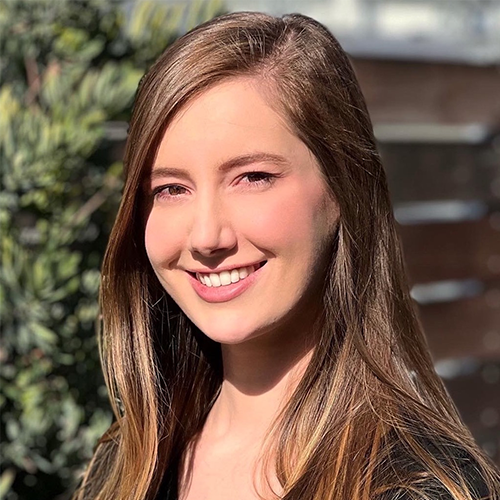
Erika M. Rosen
Alcohol Research GroupErika received her PhD in Epidemiology from the LSU Health Sciences Center in New Orleans, LA. Her dissertation work focused on the interaction between alcohol use and diet on liver injury in people with HIV. Her current research interests include the use of complex epidemiologic methods in examining the effects of policy and the built environment on alcohol use behaviors and health outcomes, especially among those from socioeconomically disadvantaged backgrounds. Erika completed her postdoctoral fellowship at the Alcohol Research Group and an assistant professor in Epidemiology job at CSU Long Beach.

Seun Aluko, MPH
Population Health Innovation LabSeun’s earned his MPH in Biostatistics and epidemiology from University of Illinois-Chicago. He currently works as a Lead Research Scientist at the Population Health Innovation Lab (PHIL) where he leads and supports research and evaluation projects that aim to connect health partners with evidence to inform systems-level approaches that can eliminate health disparities. He previously worked with California Dept. of Public Health as a Health Informaticist focused on COVID-19 and Viral & Bacterial STIs. His experience is in surveillance & outbreak response activities, research & evaluation, database management and visualization.

Thomas Greenfield
Alcohol Research GroupTom Greenfield is senior scientist at the Alcohol Research Group, PHI where he has led numerous R-series NIAAA grants. He was previously ARG scientific director and directed its National Alcohol Research Center from 1999 to 2015. Current Center projects include co-directing High Intensity Drinking research, and the Statistics and Data Services core. Tom is also Co-I on other R01s. He has published over 300 peer reviewed articles, chapters, books, monographs, and commentaries. In 2016 he received the Lifetime Achievement award from the ATOD Section of APHA, and in 2019 he was co-winner of the Jellinek Memorial Award for Alcohol Studies
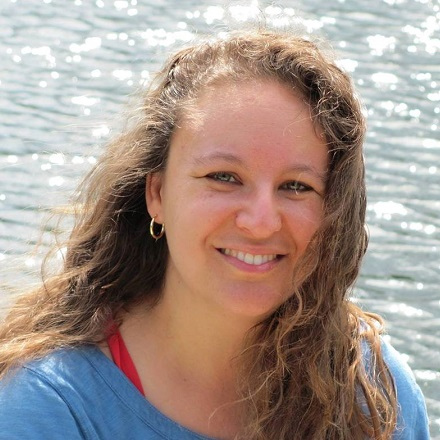
Julia Caplan, Executive Director
State of EquityJulia Caplan is Executive Director of State of Equity, which seeks to “move racial equity and health to the heart of public institutions.” Julia and her team have spent nearly 15 years working with over 100 state agencies, departments, and offices to build collaborative partnerships and incorporate racial equity, health equity, and environmental sustainability considerations into decision-making and government operations. This includes launching the California Health in All Policies Task Force, the Capitol Collaborative on Race and Equity (CCORE), supporting California’s new Racial Equity Commission, and now building a national strategy for racial equity in state governments across the US.
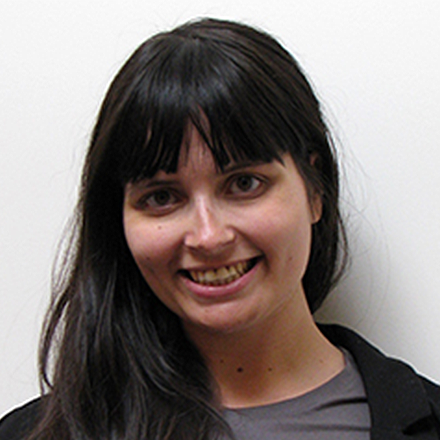
Pamela Mejia, MS, MPH, Director of Research & Associate Program Director
Berkeley Media Studies GroupPamela Mejia, MS MPH, is Director of Research and Associate Program Director at Berkeley Media Studies Group (BMSG), a nonprofit focused on narrative change, strategic communication, and media advocacy. She has more than 14 years conducting narrative research to understand how public health and social justice issues are portrayed – as well as how those portrayals impact organizing and advocacy efforts to advance health, safety, dignity, and justice for everyone.
Work With Us
You change the world. We do the rest. Explore fiscal sponsorship at PHI.
Support Us
Together, we can accelerate our response to public health’s most critical issues.
Find Employment
Begin your career at the Public Health Institute.
